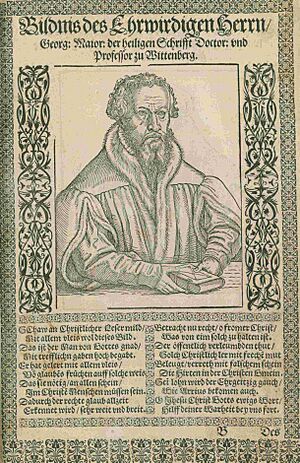Georg Major facts for kids
Georg Major (born April 25, 1502 – died November 28, 1574) was an important Lutheran thinker and leader during the Protestant Reformation. He helped shape religious ideas in his time.
Contents
Georg Major's Early Life and Education
Georg Major was born in Nuremberg, Germany, in 1502. When he was nine years old, he moved to Wittenberg. In 1521, he started studying at the university there. He was a student of two very famous people: Martin Luther and Philip Melanchthon. Melanchthon especially had a big influence on him.
Major's Career Beginnings
In 1529, Georg Major became the head teacher, or rector, of the Johannisschule in Magdeburg. Later, in 1537, he became a court preacher in Wittenberg. Martin Luther himself officially made him a minister. In 1541, Major began teaching theology, which is the study of religious beliefs.
Major's Role in the Reformation
In 1545, Georg Major joined the theology department at the university. He became very respected. The next year, a powerful leader sent him to an important meeting called the Conference of Regensburg. There, he met another influential person named Butzer.
Challenges During the Schmalkald War
Like his teacher Philip Melanchthon, Georg Major had to leave Wittenberg during the Schmalkald war. He found safety in Magdeburg. In the summer of 1547, he returned to Wittenberg. That same year, he became a church leader in Merseburg. However, he also continued his work at the university.
The Augsburg Interim and Its Impact
Georg Major was involved in discussions about the Augsburg Interim. This was a temporary religious agreement. At first, he disagreed with it, but then he made some compromises. This made some people angry, especially after he changed parts of his book, Psalterium. In this book, he had strongly criticized Maurice, who was a powerful leader. Major even asked Maurice to stop others from writing critical books. Some people accused Major of taking money from Maurice.
The Majoristic Controversy
In 1552, a leader named Count Hans Georg appointed Major to a church position in Eisleben. This count supported the Interim. However, some strict church leaders in the area immediately suspected Major. They thought he was too flexible with his beliefs. Major tried to explain his views publicly. But his explanation led to a big argument known as the Majoristic Controversy.
Major's Later Years in Wittenberg
Around Christmas in 1552, Count Albrecht removed Major from his position without a trial. Major then went back to Wittenberg. He continued his work as a professor and a member of the Wittenberg church council, called the Consistory. From then on, he was an important member of a group called the Philippists. This group followed the ideas of Philip Melanchthon.
From 1558 to 1574, Georg Major was the head of the theology department. He was also the university's rector several times. He lived long enough to see some changes in religious thought in his region. His son-in-law signed an agreement for him in 1574. This agreement rejected some ideas and supported the unity of Luther's and Melanchthon's teachings. Georg Major passed away in Wittenberg in 1574.
Georg Major's Writings
Georg Major wrote many important books and texts. Here are some of them:
- A text edition of Justini ex Trogo Pompejo historia (1526)
- An edition of Luther's smaller catechism in Latin and Low German (1531)
- Sententiae veterum poetarum (1534)
- Quaestiones rhetoricae (1535)
- Vita Patrum (1544)
- Psalterium Davidis juxta translationem veterem repurgatum (1547)
- De origine et auctoritate verbi Dei (1550)
- Commonefactio ad ecclesiam catholicam, orthodoxam, de fugiendis ... blasphemiis Samosatenicis (1569)
He also wrote comments on the letters of Paul from the Bible and sermons on different Bible passages.
 | James Van Der Zee |
 | Alma Thomas |
 | Ellis Wilson |
 | Margaret Taylor-Burroughs |


